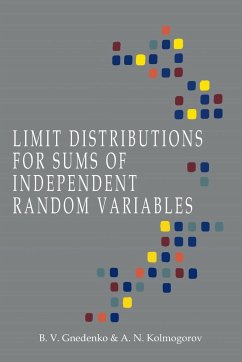2021 Reprint of the 1954 Edition. Facsimile of the original edition and not reproduced with Optical Recognition. This treatise on the fundamental limit theorems in probability theory is strong on mathematical rigor, but the presentation is equally distinguished by clarity and elegance. With broad perspectives on the development from the law of large numbers (Bernoulli, 1713) and the limit theorems of de Moivre (1730), Laplace (1812), and Poisson (1837), over the important progress made by Chebyshev (1867, 1890), Lyapunov (1901), and Lindeberg (1922), the book focuses on the progress experts had made on the subject up to the time of publication. This book may be considered a genuine classic. Of general interest is the material in the two first chapters, which may serve as a basis for any rigorous course in probability theory. The axiomatic foundation of the theory given by Kolmogorov in 1933 is here somewhat modified, the probability distributions being specified so as to form a perfect measure, a restriction which removes certain intricacies, notably in the treatment of conditional probabilities and expectations. The careful translation is based on the Russian original (1949. The two appendixes and some fifty extra footnotes give clarifying and instructive remarks.
Hinweis: Dieser Artikel kann nur an eine deutsche Lieferadresse ausgeliefert werden.
Hinweis: Dieser Artikel kann nur an eine deutsche Lieferadresse ausgeliefert werden.








